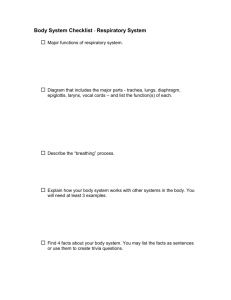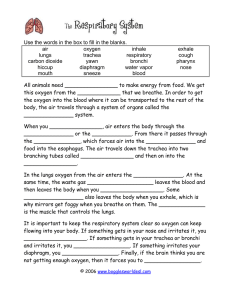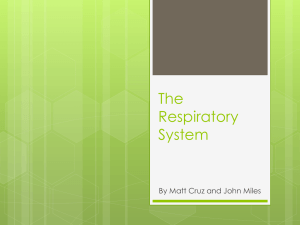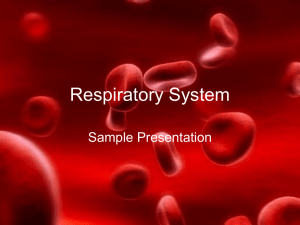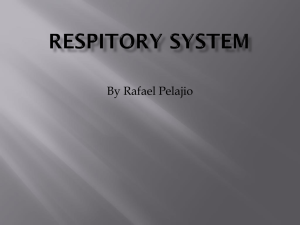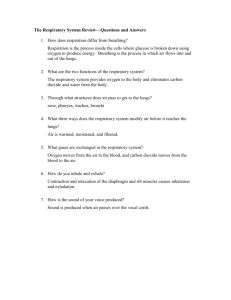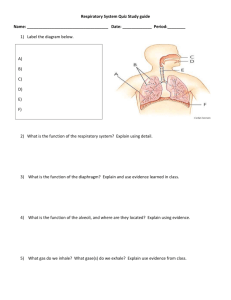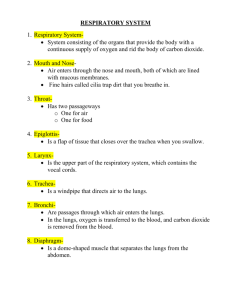By Mariah jones Organs in the system
advertisement
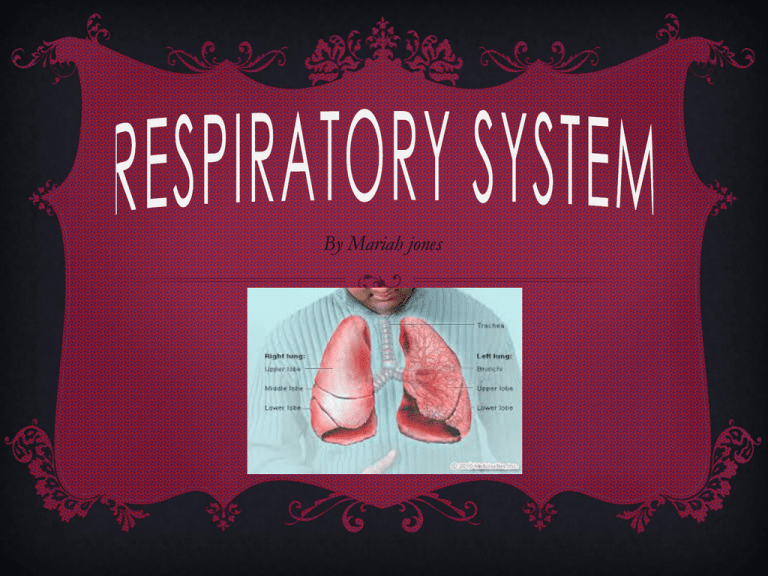
By Mariah jones Organs in the respiratory system are the lungs, mouth, nose, trachea, and diaphragm. The respiratory system is involved in the intake and exchange of oxygen and carbon dioxide between an organism and the environment. ORGANS IN THE SYSTEM FUNCTION IN THE SYSTEM In fish and many invertebrates, respiration takes place through the gills. Other animals, such as insects, have respiratory systems with very simple features. Plants also have respiratory systems but the gas exchange can be opposite to that in animals. The respiratory system in plants also includes features such as holes on the undersides of leaves known as stomata. OTHER SYSTEMS THAT WORK WITH THIS SYSTEM The respiratory system or as in ventilatory system is another name for it It works with the circulatory system If the respiratory system did not work properly, a person could become very ill and may even die The ALVEOLI are grouped together like a lot of interlinked caves, rather than existing as separate individual sacs. PROCESS OF HOW IT WORKS The respiratory system makes sure that all of the organs receive nutrients and fresh blood cells. If the respiratory system did not work properly, a person could become very ill and may even die. The system works by making the body healthy and keeping all the organs healthy. The lungs make sure the body has fresh oxygen that is sent to the heart and all of the other organs in the human body. ABOUT OTHER ORGANS Oxygen enters the respiratory system through the mouth and the Respiration is achieved through the mouth, nose, trachea. The primary function of the respiratory system is to nose. The oxygen then passes supply the blood with oxygen in order for through the larynx (where speech the blood to deliver oxygen to all parts of sounds are produced) and the the body. The respiratory system does this through breathing. When we breathe, we trachea which is a tube that enters inhale oxygen and exhale carbon dioxide., the chest cavity. lungs, and diaphragm. LUNGS The lungs are the main organs of the respiratory system. in the oxygen is taken into the body and carbon dioxide is breathed out . The red blood cells are responsible for picking up the oxygen to all the body cells, then pick up the carbon dioxide back to the lungs and we breathe it out when we exhale TRACHEA The trachea is sometimes called windpipe . The trachea filters the air we breathe and branches into the bronchi BRONCHI The bronchi are two air tubes that branch off of the trachea and carry air directly into the lungs DIAPHRAGM Breathing starts with a dome shaped muscle at the bottom of the lungs called the diaphragm .when you breathe in, the diaphragm contracts it flattens out and pulls downward . This movement enlarges the space that the lungs are in . This larger space pulls air into the lungs . When you breathe out the diaphragm expands reducing the amount of space for the lungs and forcing air out the diaphragm is the main muscle used in breathing
